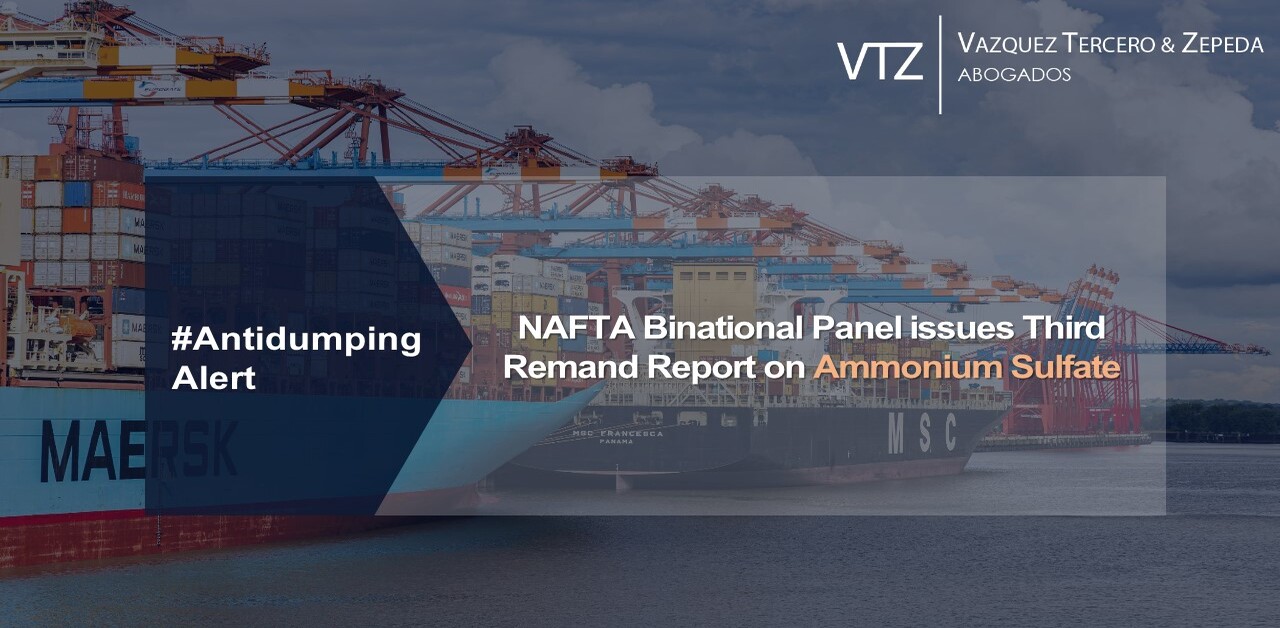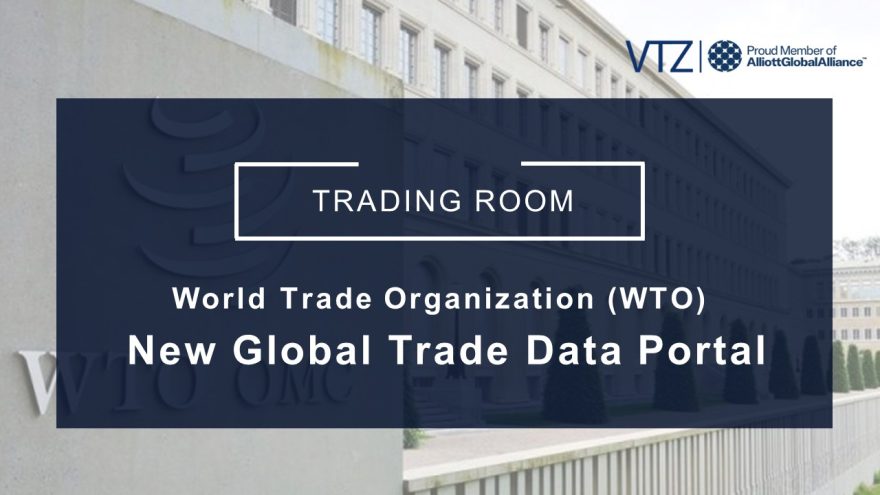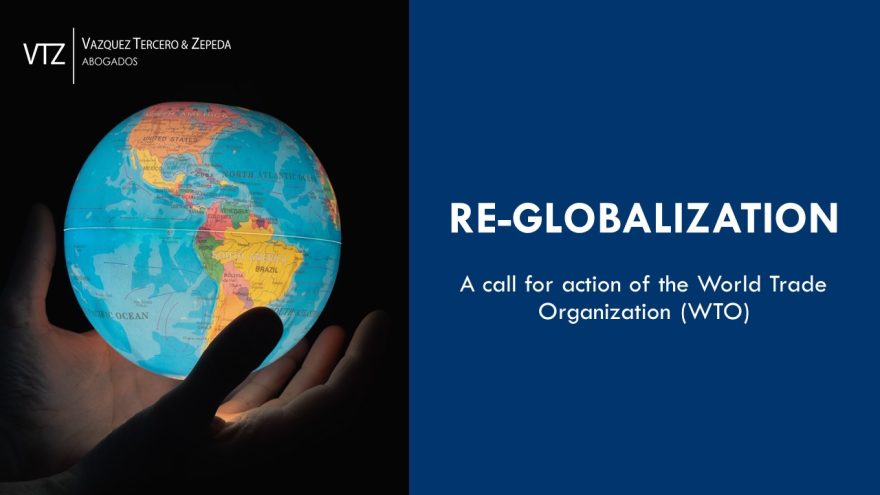NAFTA Panel on Mexican Antidumping Investigation on Ammonium Sulfate: Third Time Lucky?
On March 10, 2022, the Ministry of Economy published its third compliance report with NAFTA’s Binational Panel report regarding the Final Determination on Ammonium Sulfate. However, this decision was challenged by the complainants, and on March 29, 2022, the Third Remand Report of the Binational Panel was published in the Offical Gazette.
Despite the fact that the Binational Panel had already issued its third compliance report, the Ministry of Economy determined to extend the validity of the antidumping duties, imposed in 2015, in the Final Determination of the Sunset Review, published on March 31, 2022.
Backgroun of the Case MEX-USA-2015-1904-01
The present case arose when the companies AdvanSix Resins & Chemicals LLC (formerly Honeywell Resins Chemicals LLC) and ISAOSA, S.A de C.V, requested the review before a NAFTA Binational Panel of the final determination of the antidumping investigations on imports of ammonium sulfate originating in the United States, issued by the Ministry of Economy on October 9, 2015, pursuant to Article 1904 of the North American Free Trade Agreement (NAFTA).
Among the challenged aspects, the complainants pointed out, among other matters, that the initiation of the anti-dumping investigation was illegal because differences in physical characteristics were not taken into account in the initial determination of dumping.
As a result of the NAFTA Panel review, in November 2019 the Binational Panel issued its final decision in which it determined that the final determination issued by the Ministry of Economy was not in accordance with the Mexican antidumping and countervailing duty law and the Antidumping Agreement («ADA»).
As a consequence, the Ministry of Economy issued its First Remand Report and Compliance Determination. However, the NAFTA Binational Panel again determined that the report and determination were inconsistent with Article 5.3 ADA. Subsequently, in April 2021, the Ministry of Economy issued its Second Compliance Report and Determination. However, the NAFTA Binational Panel again determined that the reports remained inconsistent with the ADA.
Finally, in October 2021, the investigating authority issued its Third Remand Report and Compliance Determination, which was challenged by the complainants because the Ministry again justified the initiation of the investigation, seeking to remedy a violation that was committed in the initiation of the investigation with a «Final» Determination.
THIRD NAFTA PANEL DECISION, THE LAST ONE?
ISAOSA, S.A. de C.V., represented by VTZ, considered that the Ministry did not comply with the decisions of the panel because the Final Determination should be set aside and the antidumping investigation should be reinstated at the moment where the procedural defect was committed. That is to say, ISAOSA argued that the «initial» dumping analysis of the Ministry should be carried out again, but at the correct procedural moment, since the Ministry of Economy seeks to correct the incompatibilities committed in preparatory acts in a Final Determination.
Thus, the Complainants requested the Binational NAFTA Panel to remand the final determination issued by the Ministry and to order the reinstatement of the proceeding to carry out a new initial examination of dumping in a new Initiation Notice, based on the evidence in the record.
Based on the Complainants’ arguments, the NAFTA Binational Panel not only rejected the Ministry’s new analysis to justify the initiation of the investigation; the NAFTA Binational Panel agreed with ISAOSA and confirmed that the violation cannot be remedied «ex post» through a Final Determination because:
"...any corrective action has to be carried out at the stage prior to the initiation of the Investigation."
Paragraph 38, Decision of the Binational Panel regarding the third remand report. Tweet
In view of the above, the NAFTA Binational Panel remanded the compliance report to the authority and gave the Ministry 90 days to adopt measures consistent with the final decision.
VTZ CONSIDERATIONS
VTZ celebrates this decision of the panel because -finally- ISAOSA’s arguments were upheld, which are supported by the principles of Mexican Administrative Law. In the historical record of anti-dumping investigations, there are few anti-dumping investigations whose illegality or incompatibility destroys the validity of a final determination and, consequently, the proceedings are reinstated, as occurred in cases arising from other NAFTA Binational panels and WTO panels.
In fact, the Mexican Federal Court of Administrative Justice found recently illegality in the investigation of aluminum cookware, ordering to reinstate the proceeding; however, the Ministry of Economy took a surprising path by only reinstituting the proceeding as to the illegality found by the court, instead of fully reinstituting the antidumping investigation.
Despite the shortage of fertilizers and their high prices, on March 31, 2022, the Ministry of Economy issued the Final Determination of the sunset review for the antidumping duties of the United States (and China), where it determines to extend the validity of the antidumping duties for five more years.
In this sense, it remains to be seen whether the Ministry of Economy will completely reinstate the anti-dumping investigation procedure, or will take a surprising and similar path of compliance as that of aluminum cookware from China.
Need more information?
VTZ is a firm specialized in International Trade and Customs and IMMEX with a team with extensive experience, contact our members today:

Adrián Vázquez
Managing Partner

Emilio Arteaga
Jr. Partner





